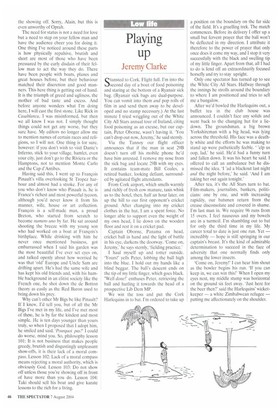Playing up
Jeremy Clarke
Stansted to Cork. Flight full. I'm into the second day of a bout of food poisoning and staring at the bottom of a Ryanair sick bag. (Ryanair sick bags are dual-purpose. You can vomit into them and pop rolls of film in and send them away to be developed and no stamp necessary.) At the last minute I tried wriggling out of the White City All Stars annual tour of Ireland, citing food poisoning as an excuse, but our captain, Peter Oborne, wasn't having it. 'You can't drop out now, Jeremy,' he said sternly.
Via the Tannoy our flight officer announces that if the man in seat 29B doesn't turn off his mobile phone he'd have him arrested. I remove my nose from the sick bag and locate 29B with my eyes. It contains team-mate Bill Coales, a retired banker, looking defiant, surrounded by agitated flight attendants.
From Cork airport, which smells warmly and richly of fresh cow manure, taxis whisk us to the hotel, then, half an hour later, on up the hill to our first opponent's cricket ground. After changing into my cricket clothes in the hut. I am a spent force. No longer able to support even the weight of my own head, I lie down on the wooden floor and rest it on a cricket pad.
Captain °borne, Panama on head, cricket ball in hand and the light of battle in his eye, darkens the doorway. 'Come on, Jeremy,' he says sternly, 'fielding practice.'
I haul myself up and totter outside. 'Yours!' yells Peter, lobbing the ball high into the blue. I hold out my hands like a blind beggar. The ball's descent ends on the tip of my little finger, which goes black. "Well done!' enthuses Peter, retrieving the ball and hurling it towards the head of a prospective Lib Dem MP.
We win the toss and put the Cork Harlequins in to bat. I'm ordered to take up a position on the boundary on the far side of the field. It's a gruelling trek. The match commences. Before its delivery I offer up a small but fervent prayer that the ball won't be deflected in my direction. I attribute it therefore to the power of prayer that only once does it come my way, and I stop it very successfully with the black and swelling tip of my little finger. Apart from that, all I had to do is fend off an extraordinarily focused horsefly and try to stay upright.
Only one spectator has turned up to see the White City All Stars. Halfway through the innings he strolls around the boundary to where I am positioned and tries to sell me a bungalow.
After we'd bowled the Harlequins out, a buffet tea in the club house was announced. I couldn't face any solids and went back to the changing hut for a liedown. The groundsman, a big brown Yorkshireman with a big head, was lying across the threshold. His face was a deathly white and the efforts he was making to stand up were pathetically feeble. "elp us oop, he said. He'd had a funny turn and fallen down. It was his heart he said. I offered to call an ambulance but he dismissed the idea. 'I 'ad a blackout last night and the night before,' he said. 'And I am taking her out again tonight.'
After tea, it's the All Stars turn to bat. Film-makers, journalists, bankers, politicians: one by one, and with increasing rapidity, our batsmen return from the crease disconsolate and covered in shame. I'm last man in. We require 96 runs from 15 overs. I feel nauseous and my bowels are in a turmoil. I'm shambling out to bat for only the third time in my life. My career total to date is just one run. Yet — incredibly — hope is still springing in our captain's breast. It's the kind of admirable determination to succeed in the face of adversity that one normally finds only among the lower insects.
'Come on, Jeremy!' I can hear him shout as the bowler begins his run. 'If you can keep in, we can win this?' When I open my eyes next, my middle stump was horizontal on the ground six feet away. 'Just here for the beer then?' said the Harlequins' wicket keeper a white Zimbabwean refugee — patting me affectionately on the shoulder.


























































 Previous page
Previous page